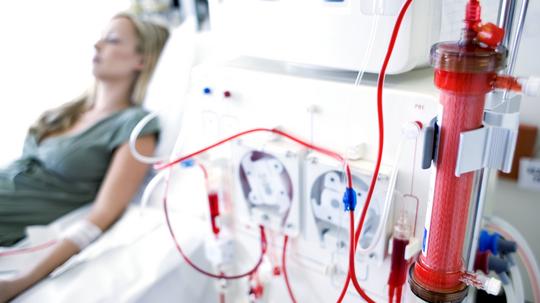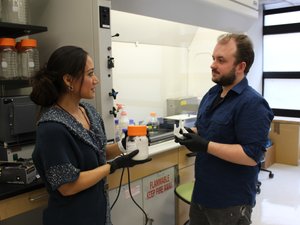
About 30 million people in the U.S. are estimated to have chronic kidney disease, according to the Centers for Disease Control and Prevention. However, with limited access to dialysis care, many patients go untreated. But a new Chicago startup aims to help.
Simergent, founded in 2014 by Steve Lindo and Rick Pendergraft, is developing a home dialysis machine to deliver safe and effective automated peritoneal dialysis therapy to end stage renal disease patients. Though the product is still in the development phase, the founders say their device will be cheaper than other market-leading home dialysis machines and simpler to use.
The startup raised a $2.8 million seed round in April, led by Oklahoma-based venture firm i2E. The financing will be used to complete the design, manufacturing and regulatory testing of the device, Lindo said. The goal is to get the machine 510(k) clearance from the U.S. Food and Drug Administration in the next two years.
When Simergent’s product hits the market, the company will be selling it directly to dialysis clinics and providers, who would then recommend this device to their patients. Most of the machines will be paid for using Medicare budgets allocated to dialysis providers, Lindo said.
Home dialysis therapy is not only more convenient for patients, but it also costs less for patients as well as their providers.
“Medicare could save a lot of money if you could shift more of those patients into the home,” Lindo said.
Lindo originally met his co-founder Pendergraft while studying aerospace and mechanical engineering at the University of Oklahoma. After graduating, Lindo worked at major healthcare device and equipment companies, such as Baxter, and later did consulting for similar types of companies.
Working in the industry, he identified the common problems with many of the home dialysis machines on the market and started working on the Simergent prototype.
“It was great that I was helping these big, giant corporations develop their devices, but there were certain things they were unwilling to do,” Lindo said. “They were looking to make minor changes to their existing products on the market, but not necessarily the transformational kind of changes that maybe really needed to be made.”
Patients that receive dialysis at home have been implanted with catheters that connect to machines that administer therapies at night while they sleep. Simergent’s machine works similarly, but does so in a simple and discrete manner, Lindo said.
The startup’s device has a color touchscreen with photos that walk patients through the steps of how to connect themselves to the device and administer therapies through it. Simergent’s device also has a feature to prevent peritonitis, a condition in which the tissue that lines the inner wall of the abdomen becomes inflamed.
Additionally, unlike other machines that can be noisy at night while patients are trying to sleep, Simergent’s is silent, says Lindo.
Beyond the U.S., Lindo said Simergent being a more affordable option than many others will allow them to sell it in emerging countries in the future, such as Mexico, China and India. More than 2 million patients die each year in emerging markets because they either can’t access or afford dialysis therapy.
Simergent, which works out of healthcare startup incubator MATTER, employs four people.








